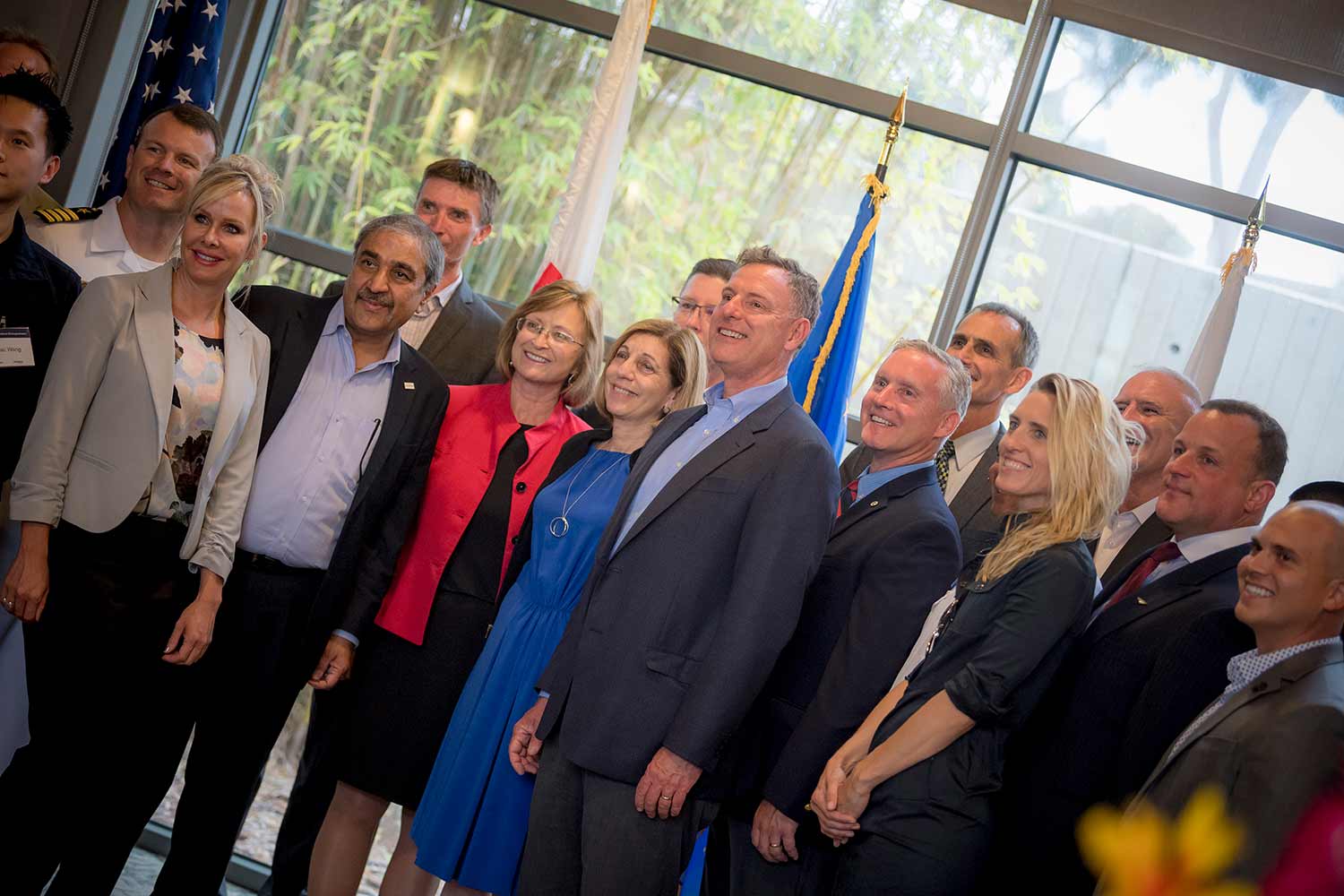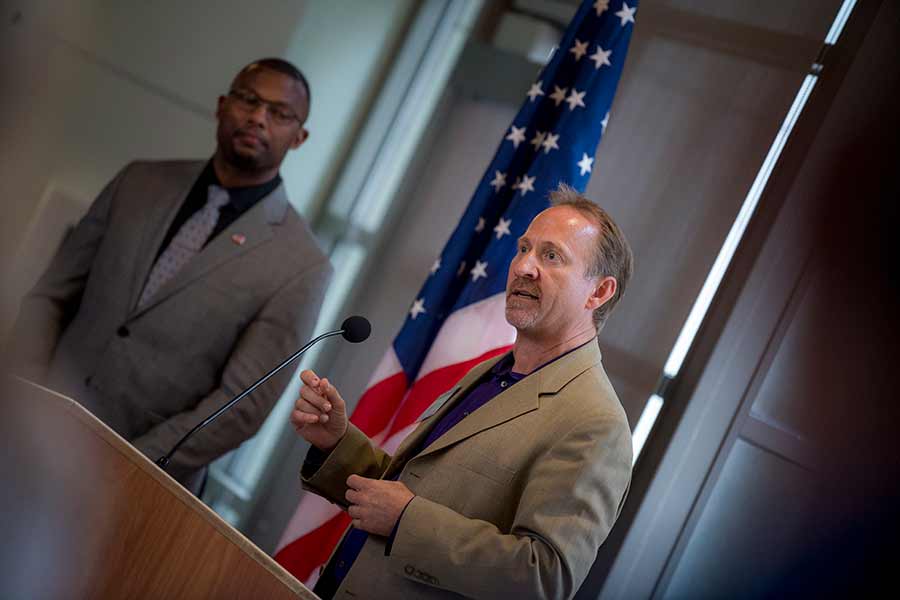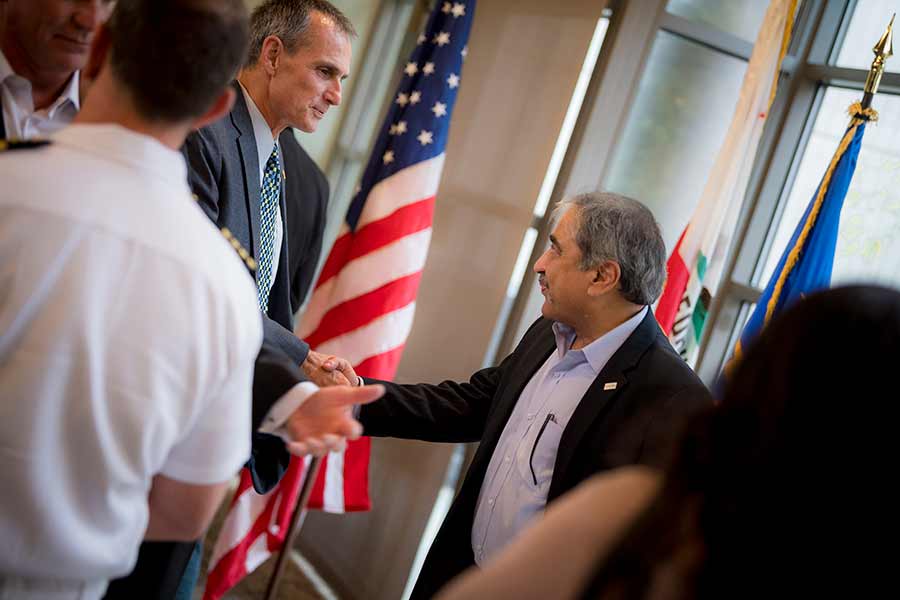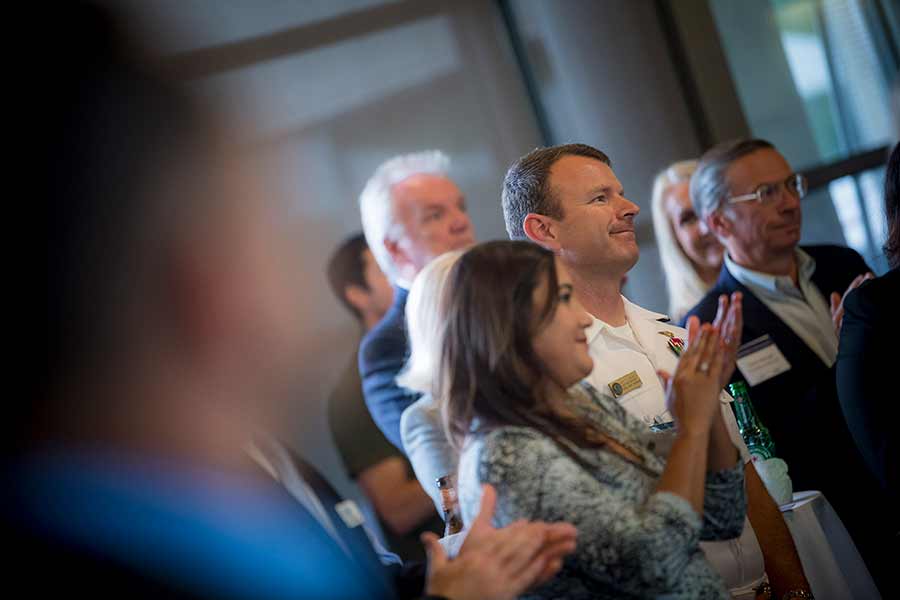
By:
- Kim McDonald
Published Date
By:
- Kim McDonald
Share This:

At center, from left to right, Chancellor Pradeep K. Khosla, Vice Chancellor for Research Sandra Brown, San Diego City Council President Pro Tem Barbara Bry and Rep. Scott Peters celebrate the new veteran programs and their graduates at last week’s ceremony. Photos by Erik Jepsen/UC San Diego Publications
Battlefield 101
Veterans are taught how to use combat skills to start companies
San Diego is home to one of the largest concentrations of military veterans in the nation—some 250,000 retired service members. But the transition to civilian life for many of those who have started second careers in this military-friendly community isn’t always easy.
“The typical experience of a veteran trying to get a job in the civilian world is to have an interview where it’s very formal, the stakes are high and they’re very uncomfortable,” said Jeff (J.D.) Davids, a U.S. Marine Corps veteran and local entrepreneur who has been helping other veterans start companies for more than 25 years.

Jeff (J.D.) Davids, who launched Startup Battlefield 101: “We present it as if it’s a military mission, and that really gives them a lot more confidence.”
Part of the reason is the difference in language between service members and civilians. Another is the difference in military and civilian culture. But when Davids realized that some mission-oriented veteran entrepreneurs, like himself, achieved commercial successes by using the mindset they developed when preparing for combat, it gave him an idea.
This spring, Davids partnered with UC San Diego’s Office of Innovation and Commercialization to launch Startup Battlefield 101. This innovative eight-week, online program run by UC San Diego Extension teaches transitioning military veterans to approach their work as an entrepreneur (or their work in any kind of industry, for that matter) as if they were preparing for a military mission on the battlefield.
“One of the things that makes this program unique is that we present it as a simulated battlefield,” said Davids, who also founded Smart Money Veterans, a local nonprofit designed to help transitioning service members. “We tell them, “You went to Afghanistan and you learned a new language and a new landscape and customs. You figured out who your allies and enemies were. You had strategic assets and an objective. Being an entrepreneur is the same thing. It’s just different acronyms and language.’ We present it as if it’s a military mission, and that really gives them a lot more confidence.”
Last week, more than 50 veterans involved in Startup Battlefield 101, and Veteran Ventures, another UC San Diego program launched two years ago by the Rady School of Management to help veteran entrepreneurs, met on campus with Chancellor Pradeep K. Khosla, Rep. Scott Peters and San Diego City Council President Pro Tem Barbara Bry. The goal was to celebrate the two programs, showcase the new veteran companies and underline the commitment to veterans by UC San Diego, the first university in the nation to make available its campus-based entrepreneurial programs to all veterans in the community.
Some of those veteran-led enterprises also will be showcased at the end of June at San Diego Startup Week, the region’s largest entrepreneurial event of the year, which is expected to draw more than 5,000 founders, investors and innovators. With more than 45 companies coming out of UC San Diego every year, the campus is playing a larger role at this year’s event with specific networking opportunities.
“I think it’s very, very important that we at UC San Diego focus on our veterans and try to create opportunities for them,” Chancellor Khosla emphasized to the group.
Among the veterans at last week’s event was Ty Smith, a former Navy Seal who participated in Startup Battlefield 101 at the request of Davids. Two years ago, Smith founded a San Diego-based company called Vigilance Risk Solutions, which makes workplaces and schools less vulnerable targets to active shooters. His company, which has grown to 12 employees and has rapidly expanded throughout California and nearby states, provided practical lessons for other veterans enrolled in the program.
“If I can show other veterans how to avoid the mistakes I made and provide guidance to them that’s something that’s very important to me,” he said.

Chancellor Khosla: “I think it’s very, very important that we at UC San Diego focus on our veterans and try to create opportunities for them.”
“We had a nice mixture of active duty military, veterans and startup veterans, and we all shared information,” said Staci Reidinger, a 23-year veteran of the Marine Corps who recently retired from Camp Pendleton and landed a job at the UPS headquarters in San Diego while participating in Startup Battlefield 101.
“What I’m finding is that here in San Diego we have military members who are trying to decide whether they want to stay in the area or they want to move to other places or they want to go to work with a civilian organization or start their own business. And we’re finding they’re not prepared, mostly because they don’t know how to translate their military training and leadership skills into the civilian sector.”
“The problem is that most of the programs out there designed to help transitioning veterans teach them how to stop speaking military and start speaking civilian,” said Davids. “But there’s a lot of crossover that’s really helpful in terms of executing a mission that they should actually be encouraged to maintain. Not so much the language, but the tactics and the strategies, the way you approach problem solving. Because the one thing that’s similar to being in the military and being an entrepreneur is that you have a complex problem to solve, you have a constantly changing environment and it’s a high risk environment. That’s what people in the military do every day.”
Sean Haggerty, a retired Navy Seal who received his MBA at the Rady School of Management, while starting Protector Brewery, San Diego’s first and only organic brewery, concurs. Haggerty, who serves as a mentor for other veterans in Rady’s Veteran Ventures program, which was started by another Rady graduate and Marine Corps veteran, Michael Hayden, said he’s found in his commercial brewery that veterans make especially dedicated employees.

Most of the veterans at UC San Diego—a total of about 300 undergraduate and 150 graduate students—served in the U.S. Navy and Marine Corps.
“The reason why we like to hire veterans is because, in my experience, there’s this level of work ethic that’s extremely powerful,” he said. “And being a veteran and interacting with veterans we can almost sense between each other when something has to get done.”
Recognizing the camaraderie that exists between veterans and the fact that veterans have unique problems as undergraduate and graduate students, UC San Diego five years ago established the Student Veterans Resource Center. It not only serves as a resource for the approximately 300 undergraduate students and 150 graduate students, most of whom are U.S. Navy and Marine Corps veterans, but tries to bring them together and integrate them into the campus community.
“It’s important to have veterans for the rich experience they bring to the campus community,” said Chryssa Jones, head of the center. “They’ve got so much life experience to contribute, so much more diversity to add in terms of age, skills and training. A lot of them have significant barriers to degree completion that are unique to the rest of the campus community. Not just work and family obligations but the transition from military culture to civilian culture, which is unique and significant. And, of course, many of them are dealing with disabilities and traumas related to their military service.”
“What we’ve found is that the veterans that come here are more diverse than our general student body,” she added. “The average age of the students using our center is around 36, so they’re much older than most of our students. They also have high goals. Ninety percent of our incoming undergraduate veteran students are planning on going to graduate school. So they’re not just looking at getting their degree and getting out. They’re looking at a long-term commitment to education and research in their field.”
Share This:
You May Also Like
Stay in the Know
Keep up with all the latest from UC San Diego. Subscribe to the newsletter today.


